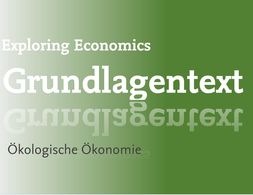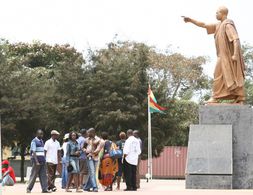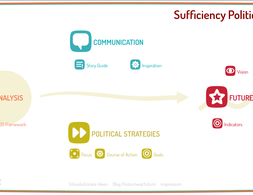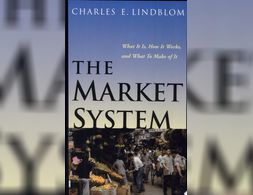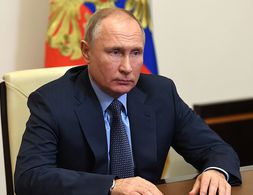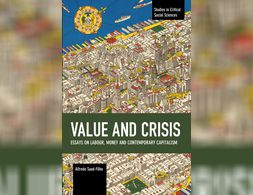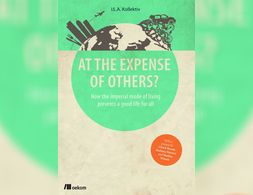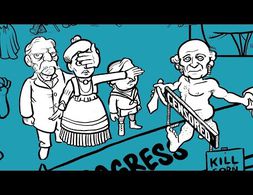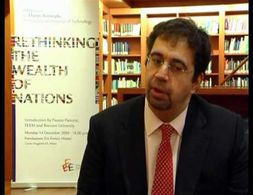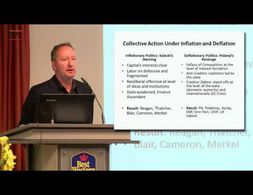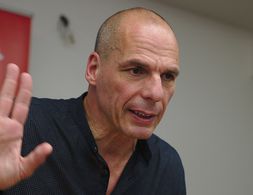1039 Ergebnisse
The 2007–08 credit crisis and the long recession that followed brutally exposed the economic and social costs of financialization. Understanding what lay behind these events, the rise of “fictitious capital” and its opaque logic, is crucial to grasping the social and political conditions under which we live. Yet, for most people, the operations of the financial system remain shrouded in mystery.
This paper investigates how the concept of public purpose is used in Modern Monetary Theory (MMT). As a common denominator among political scientists, the idea of public purpose is that economic actions should aim at benefiting the majority of the society. However, the concept is to be considered as an ideal of a vague nature, which is highly dependent on societal context and, hence, subject to change over time. MMT stresses that government spending plans should be designed to pursue a certain socio-economic mandate and not to meet any particular financial outcome. The concept of public purpose is heavily used in this theoretical body of thought and often referred to in the context of policy proposals as the ideas of universal job guarantee and banking reform proposals show. MMT scholars use the concept as a pragmatic benchmark against which policies can be assessed. With regards to the definition of public propose, MMT scholars agree that it is dependent on the social-cultural context. Nevertheless, MMT scholars view universal access to material means of survival as universally applicable and in that sense as the lowest possible common denominator.
Understanding international trade is central to economics and is currently a hot political issue. It’s an area where popular perceptions of mainstream economics are low, since they have historically missed some important downsides of trade agreements, especially the hollowing out of former manufacturing hubs in the Western world. et economists have for long time had a theory of trade with an impressive amount of scientific clout behind it: the gravity trade model.
Readers of economic and political theory as well as students of economic planning will appreciate this classic, now available for the first time in English. Written eighty years ago, when Sorel became disillusioned with the official socialism of the German and French Marxist parties, this new translation presents Sorel's analysis of the rise and fall of the two great modern ideologies: socialism and liberal capitalism.
The Privatized State shows how privatization undermines the very reason political institutions exist in the first place, and advocates for a new way of administering public affairs that is more democratic and just.
The general idea of a Job Guarantee (JG) is that the government offers employment to everybody ready, willing and able to work for a living wage in the last instance as an Employer of Last Resort. The concept tackles societal needs that are not satisfied by market forces and the systemic characteristic of unemployment in capitalist societies. Being a central part of the Modern Monetary Theory (MMT), attention for the JG concept rose in recent years.
In this lecture, Sanjay Reddy reviews the work of János Kornai, especially his critique of the socialist system, which is rooted in his understanding of the eminently political character of socialism.
In this episode of the podcast "Hear this idea", Dr. Carolina Alves delves into the political debate surrounding Heterodox Economics and elaborates on D-Econ's mission to promote greater inclusivity in the field of Economics concerning gender, race, and representation from the Global South.
An essay of the writing workshop on contemporary issues in the field of Nigerian economics: The adverse effect of climate change is overwhelming, not just in Nigeria but globally. Global warming is the result of hostile human activities that have impacted the environment negatively. This is the principal variable the government should tackle through practical innovations such as the acceptable implementation of Adaptation Policies and also through the adequate implementation of environmental tax. These will enhance pro-environmental behaviour which is fit for socio-political and economic activities for sustainability.
Environmental catastrophe looms large over politics: from the young person’s climate march to Alexandria Ocasio-Cortez’s Green New Deal, increasing amounts of political space are devoted to the issue. Central to this debate is the question of whether economic growth inevitably leads to environmental issues such as depleted finite resources and increased waste, disruption of natural cycles and ecosystems, and of course climate change. Growth is the focal point of the de-growth and zero-growth movements who charge that despite efficiency gains, increased GDP always results in increased use of energy and emissions. On the other side of the debate, advocates of continued growth (largely mainstream economists) believe that technological progress and policies can ‘decouple’ growth from emissions.
Das Paradigma der ökologischen Ökonomie (Ecological Economics) stellt einen multidisziplinärern Ansatz dar, um ein ganzheitliches Bild der wachsenden ökologischen Probleme und ihrer Verflechtungen mit der Ökonomie zu erhalten. Sie beschäftigt sich mit Ressourcenknappheit, Umweltverschmutzung, Klimawandel, Nahrungsmittelknappheit oder sozialer Ungleichheit. Hierbei werden wissenschaftliche Disziplinen wie Ökologie, Ökonomie, Physik und zunehmend auch andere Sozial- und Geisteswissenschaften (z.B. Soziologie oder Philosophie) herangezogen, mit dem Ziel, im ökonomischen Denken auch ökologische, ethische, politische, institutionelle und soziale Faktoren zu berücksichtigen. In diesem Zusammenhang werden nichtzuletzt deshalb auch wesentliche Grundannahmen der orthodoxen Ökonomie sehr kritisch betrachtet (Constanza 1989, Ayres 2008, Spash 2010).
This article introduces the series, “Reclaiming Africa’s Early Post- Independence History,'' from Post-Colonialisms Today. It explores the policies and thinking of African governments in the early post-independence period, and the lessons for today’s struggles for political and economic agency on the continent.
This book represents a new foundation for the study of microeconomics, viewed from a broad perspective that takes into account new developments at the intersections with psychology, political science, the natural sciences and philosophy.
In the course Sociology and Socialism, students engage with classical theories of socialism as well as their applications in a variety of historical and international contexts. Staunchly interdisciplinary, the course utilizes expertise in philosophy, history, economics, sociology, anthropology and political theory.
The Sufficiency Policy Map is an online tool for initiatives, political actors, organisations and individuals. It provides recommendations, strategies and communication tools for realizing projects and policy around the topic sufficiency. Sufficiency projects have the aim to reduce one's own ecological footprint.
Macroeconomics in Context: A European Perspective lays out the principles of macroeconomics in a manner that is thorough, up to date, and relevant to students. With a clear presentation of economic theory throughout, this latest addition to the bestselling "In Context" set of textbooks is written with a specific focus on European data, institutions, and historical events, offering engaging treatment of high-interest topics, including sustainability, Brexit, the euro crisis, and rising inequality. Policy issues are presented in context (historical, institutional, social, political, and ethical), and always with reference to human well-being.
The Routledge Handbook of Heterodox Economics presents a comprehensive overview of the latest work on economic theory and policy from a 'pluralistic' heterodox perspective.
Contributions throughout the Handbook explore different theoretical perspectives including: Marxian-radical political economics; Post Keynesian-Sraffian economics; institutionalist-evolutionary economics; feminist economics; social economics.
The core idea of ecological economics is that human economic activity is bound by absolute limits. Interactions between the economy, society and the environment are analysed, while always keeping in mind the goal of a transition towards sustainability.
Michael Kalecki famously remarked “I have found out what economics is; it is the science of confusing stocks with flows”. Stock-Flow Consistent (SFC) models were developed precisely to address this kind of confusion. The basic intuition of SFC models is that the economy is built up as a set of intersecting balance sheets, where transactions between entities are called flows and the value of the assets/liabilities they hold are called stocks. Wages are a flow; bank deposits are a stock, and confusing the two directly is a category error. In this edition of the pluralist showcase I will first describe the logic of SFC models – which is worth exploring in depth – before discussing empirical calibration and applications of the models. Warning that there is a little more maths in this post than usual (i.e. some), but you should be able to skip those parts and still easily get the picture.
Economics is dogmatic, monolithic, merely quantitative, highly normative, strongly political, primarily ethical, pseudo-scientific, and manipulative.
In this clear and accessible book, an eminent political scientist offers a jargon-free introduction to the market system for all readers, with or without a background in economics
In this interview Ilya Matveev discusses the social, political, economic, and ideological foundations of the Russian regime, to provide additional context about Russia’s geopolitical goals.
This course will expose students to some of the key debates that link digital transformations to economic, social, and political inequalities. Students will be familiarised with a variety of theoretical movements in development studies and internet studies: exploring thinking that frames the internet as a leveller that can bridge divides vs. exploring the internet as an infrastructure that amplifies existing inequalities.
Value and Crisis brings together selected essays written by Alfredo Saad-Filho, one of the most prominent Marxist political economists writing today. Divided into two parts, "Essays on the Theory of Value" and "Essays on Contemporary Capitalism," this book examines the labour theory of value from a rich and innovative perspective from which fresh insights are derived.
Today it feels like everybody is talking about the problems and crises of our times: the climate and resource crisis, Greece's permanent socio-political crisis or the degrading exploitative practices of the textile industry.
This brief views the environment through diverse lenses – those of standard economics, institutional economics, political science, environmental science and ecology.
Philosopher and political economist John Stuart Mill laid several foundations for liberal thinking, amongst others with the harm principle: everyone should be given the individual freedom - and not be hindered by e.g. state intervention - to act as s/he wants as long as no other person is harmed by this action. A short insight in his book On Liberty.
In this interview, Daron Acemoğlu provides a definition of institutions as rules that govern how individuals interact and speaks about social, political and economic institutions. He furthermore presents his view on bad or good institutions and the importance of the latter. The video is part of a larger interview, where he elaborates his perspective on differing prosperities of states and the relation between growth and democracy.
Mark Blyth criticises the political inability to solve the persistent economic crisis in Europe against the background of a deflationary environment. Ideological blockades and impotent institutions are the mutually reinforcing causes of European stagnation. The deeper roots lie in the structural change of the economic system since the 1980s, when neoliberalism emerged as hegemonic ideology. This ideology prepared the ground for austerity and resulting deflationary pressures and a strategy of all seeking to export their way out of trouble. Worryingly this is breeding populist and nationalist resentments in Europe.
In this article, Rob Hoveman breaks down concepts like historical materialism and materialist analysis that are pivotal to understand Marx. He argues that abstractions are necessary for a concrete analysis of society that in turn should inform political practice.
In this article, Gareth Dale analyzes and compares the main characteristics and differences of two visions that are currently emerging to tackle Climate Change: the Green New Deal and Degrowth. Which are the consequences from the environmental, economic and political point of view? And what are the underlying doctrines?
Yanis Varoufakis, former finance minister of Greece and the co-founder of the international DiEM25 platform, discusses the economic and political impacts of the Covid-19 Pandemic, in particular with regards to the Eurozone and southern European countries.
Wir nutzen Cookies. Klicke auf "Akzeptieren" um uns dabei zu helfen, Exploring Economics immer besser zu machen!











